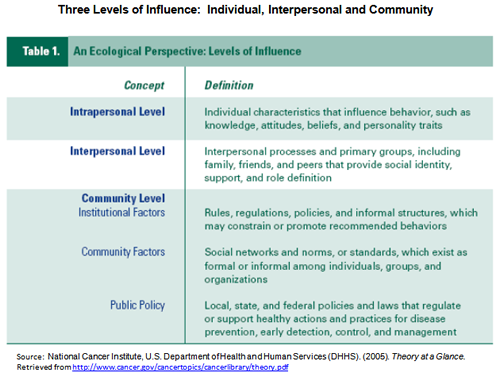Online Course
NRSG 780 - Health Promotion and Population Health
Module 9: Program Planning: Focus on Behavior Change
Behavior Change: An Ecological Perspective
Effective public health and health promotion programs help maintain and improve health and the well-being and self-sufficiency of individuals, families, organizations and communities. They generally require behavior change at multiple levels. Programs that are most likely to succeed are based on understanding targeted behaviors and their environmental context. Health behavior theory is a key component in the program planning, implementation and evaluation process.
What is a theory?
A set of interrelated concepts, definitions and proposals that present a systematic view of events or situations by specifying relationships among variables to explain or predict events or situations.
Behavior change theories investigate answers to the why, what and how health problems should be addressed.
Health Promotion has an ecological perspective that involves more than educating individuals and the community about health practices. It includes efforts to change organizational behavior and physical and social environments of communities. It is also about developing and advocating for policies that support health.

This website is maintained by the University of Maryland School of Nursing (UMSON) Office of Learning Technologies. The UMSON logo and all other contents of this website are the sole property of UMSON and may not be used for any purpose without prior written consent. Links to other websites do not constitute or imply an endorsement of those sites, their content, or their products and services. Please send comments, corrections, and link improvements to nrsonline@umaryland.edu.